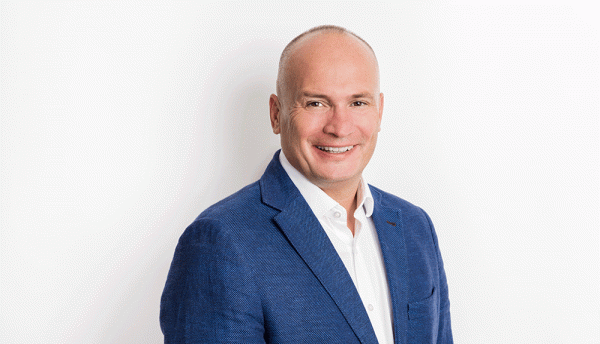CyrusOne is one of the largest data centre providers in the US, providing enterprise colocation solutions. Simon Ford, AVP EMEA, CyrusOne tells Intelligent Data Centres about his most memorable achievement in his career and about his style of management.
What would you describe as your most memorable achievement in the data centre industry?
I’ve spent my career working in a variety of different companies focused in the tech sector including Nokia, CBRE and Level(3) spanning a number of services from fibre, to real estate and data centres. I have lived and worked through the peaks and troughs of three financial crises, so to pick out one memorable achievement is a real challenge as it has been an exciting ride.
However, one of the most game-changing moments for me – and one that provided a significant springboard in my career – was in 2001 when I was working for a telecommunications firm as the European Head of Real Estate, responsible for its offices and data centre facilities where critical infrastructure information is held. After the Dot.com bubble burst, the real estate markets in the UK and Europe were massively impacted. During this pressured time, many global telecom businesses were turning to Chapter 11 protection. My team was under enormous pressure to provide cost savings fast and we needed to start thinking creatively about how we safeguard the business. At first, we focused on the obvious OPEX budget and tried to extricate ourselves from our portfolio on newly signed leases. However, I had to think on my feet and wondered if we could do things differently. It was clear at the time that IT budgets in most corporations were being cut, and real estate departments were being asked to be more involved in the acquisition of data space. So, we created a real estate peer sales channel, leading to several successful data centre deals that created significant revenue for the company and ultimately kept the team together.
What first made you think of a career in technology/data centres?
When I graduated in 1992, at the height of another financial crisis, it was clear that I, and my peers, had to diversify to make a living. While I was using my land surveying skills to position in-shore drilling rigs conducting geo-techinical investigations, a couple of friends were working at a start-up telco business in London and involved in building access and negotiating fibre into office buildings. This company was MFS and was one of the first wave of telcos building out across Europe in a newly de-regularised industry. This was the first push of privatised telecoms in the UK, and the industry looked to be dynamic and growing. I really wanted to be part of it and so applied for a job in building access, negotiating the fibre into multi tenanted buildings in London. It was exhilarating when I landed my role with the company at such an exciting time.
What style of management philosophy do you employ with your current position?
The data centre sector is very diverse and requires a wide range of skills set and draws on a series of expertise, such as engineers, architects, real estate and legal professionals, to be successful. As a result, we are truly dependent on each staff member to bring their best to the team. That is why I favour leadership that fosters collaboration and gives everyone a purpose in the success of the group. I have never believed that a ‘stick’ approach to management yields excellent results long-term. It is essential to empower everyone and provide them with the space and support to thrive and reach their full potential.
What do you think is the current hot talking point within the data centre space?
Demand is ever increasing, and the availability of scalable land in core markets like Frankfurt and London is a significant challenge for data centre providers. As a sector, we have played a major role in enabling many businesses to employ work from home policies during the COVID-19 crisis, however many facilities across Europe are all operating close to capacity as demand continues to soar.
In the industry, our constant challenge as an operator is to stay one step ahead of the demand and provide the capacity our clients need at the right time and in the right location. So, as plots of land and power availability become scarcer in those data centre prime data regions, that will continue to present a challenge for future growth. As a sales lead with a background in real estate, I have direct input into our European Product Development strategy to ensure we are synchronised to our clients’ needs.
Additionally, climate change and global warming promise catastrophic consequences if we all fail to control and reduce global carbon emissions. While all businesses and industries share responsibility, data centres and their operators have a particular obligation to pursue sustainability objectives given their concentration of global energy and water footprints.
How do you deal with stress and unwind outside the office?
I love open water swimming, and I am a member of a quirky club in London, the Serpentine Swimming Club, which was founded in 1864. I find swimming is a fantastic way to disconnect from everything truly and just get into the rhythm of moving along gradually, being outside also, you are not confined by swimming lanes or the luxury of seeing the bottom of the pool! I also love music and have played in many cover bands over the years. Most notably, Simon & Nickfunkel when I lived in Geneva. We claimed to be ‘Geneva’s best-looking cover duo’ on the basis that we were the only duo doing covers and thus factually correct.
What do you currently identify as the major areas of investment in your industry?
People. The industry relies on great people with very technical know-hows and expertise which can take time to build and develop. The issue today is where the next generation of talent comes from. As professionals, we must do more to promote our sector and raise awareness among young people and demonstrate that this can be a very dynamic, exciting career. We have successfully grown through this terrible COVID-19 pandemic, and we have found some amazing new talent. However, to build for the future, we must prioritise attracting new talent.
What are the region-specific challenges you encounter in your role?
As a global business, we work with hundreds of colleagues and partners across the world. In my role, that is no different. As an organisation that relies on a global supply chain and expertise, it can be a challenge to align different regional standards across our portfolios. A regulatory standard in North America may not apply in Europe and vice versa, so it is important that these differences are adequately communicated internally and to our customers to manage expectations, particularly as it translates into contractual obligations.
What changes to your job role have you seen in the last year and how do you see these developing in the next 12 months?
During this crisis, we have seen customers’ procurement attitude evolve. Cloud companies are increasingly interested in working with data centre providers in a new way which is transforming the relationship we hold with them. Enterprises and hyperscalers are now interested in working with partners with a more comprehensive solution tailored to their requirements. We anticipate that large-scale companies will look to consolidate the number of suppliers and solutions providers as they continue to seek out bespoke cloud models that are agile and flexible enough to meet future challenges.
Furthermore, the scale of capacity demand and new facilities have accelerated in the past 18 months or so. In recent years we have seen the average take down double, if not triple, from 4-6MW to 10MW plus. Additionally, the sizes of facilities and campuses are due to grow with demand for hybrid cloud solutions post COVID-19 driving the need for larger data centres. We can expect 100MW sites to become more commonplace in the next five years. This trend will come with all the critical challenges needed to make such sites successful, namely land, power and other utilities – but that is a challenge we must overcome if we are to continue to enjoy our Internet services moving forward.
Click below to share this article




